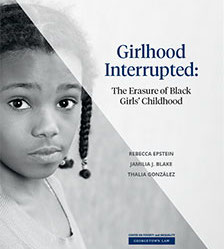 A new report from the Center on Poverty and Inequality at the Georgetown University Law Center finds that adults view Black girls as less innocent and more adult-like than their White peers, especially in the age range of 5-14.
A new report from the Center on Poverty and Inequality at the Georgetown University Law Center finds that adults view Black girls as less innocent and more adult-like than their White peers, especially in the age range of 5-14.
A survey conducted by the authors of the report revealed that adults think:
- Black girls seem older than White girls of the same age.
- Black girls need less nurturing than White girls.
- Black girls need less protection than White girls.
- Black girls need to be supported less than White girls.
- Black girls need to be comforted less than White girls.
- Black girls are more independent than White girls.
- Black girls know more about adult topics than White girls.
- Black girls know more about sex than White girls.
“What we found is that adults see Black girls as less innocent and less in need of protection as White girls of the same age,” said Rebecca Epstein, lead author of the report and executive director of the Center on Poverty and Inequality at the Georgetown University Law Center. “This new evidence of what we call the ‘adultification’ of Black girls may help explain why Black girls in America are disciplined much more often and more severely than White girls – across our schools and in our juvenile justice system.”
 Jamilia Blake, an associate professor of educational psychology at Texas A&M University and a co-author of the study, added that “these findings show that pervasive stereotypes of Black women as hypersexualized and combative are reaching into our schools and playgrounds and helping rob Black girls of the protections other children enjoy.”
Jamilia Blake, an associate professor of educational psychology at Texas A&M University and a co-author of the study, added that “these findings show that pervasive stereotypes of Black women as hypersexualized and combative are reaching into our schools and playgrounds and helping rob Black girls of the protections other children enjoy.”
The full report, Girlhood Interrupted: The Erasure of Black Girls’ Childhood, may be downloaded here.











Its a shame really. Everyone, black/white are God’s gift. Discrimination on skin colour is really heartbreaking.
Who are these Adults??? Most educators in our public schools these days are younger white women (attend the Nat’l Assoc. for the Education of Young Chilten and National Education Assoc. Conferences and observe the majority of attendees) who, for the most part have had limited contact with Black children and more often subscribe to main streem biases and misinformation. (Black boys are equally mistaken for being older than they are … witness the cops who kill black boys who they see as “men” .
The teachers who knew and provided excellent educational experiences for Black girls and boys were Black teachers – Black Men and Women – who knew these children and viewed and taught them in an age appropriate ways. Regrettably, the majority of them lost their jobs (or were removed from classrooms) when “school integration” became the law of the land!!!
Almost makes one want to “go back to the old ways/…days”!!!